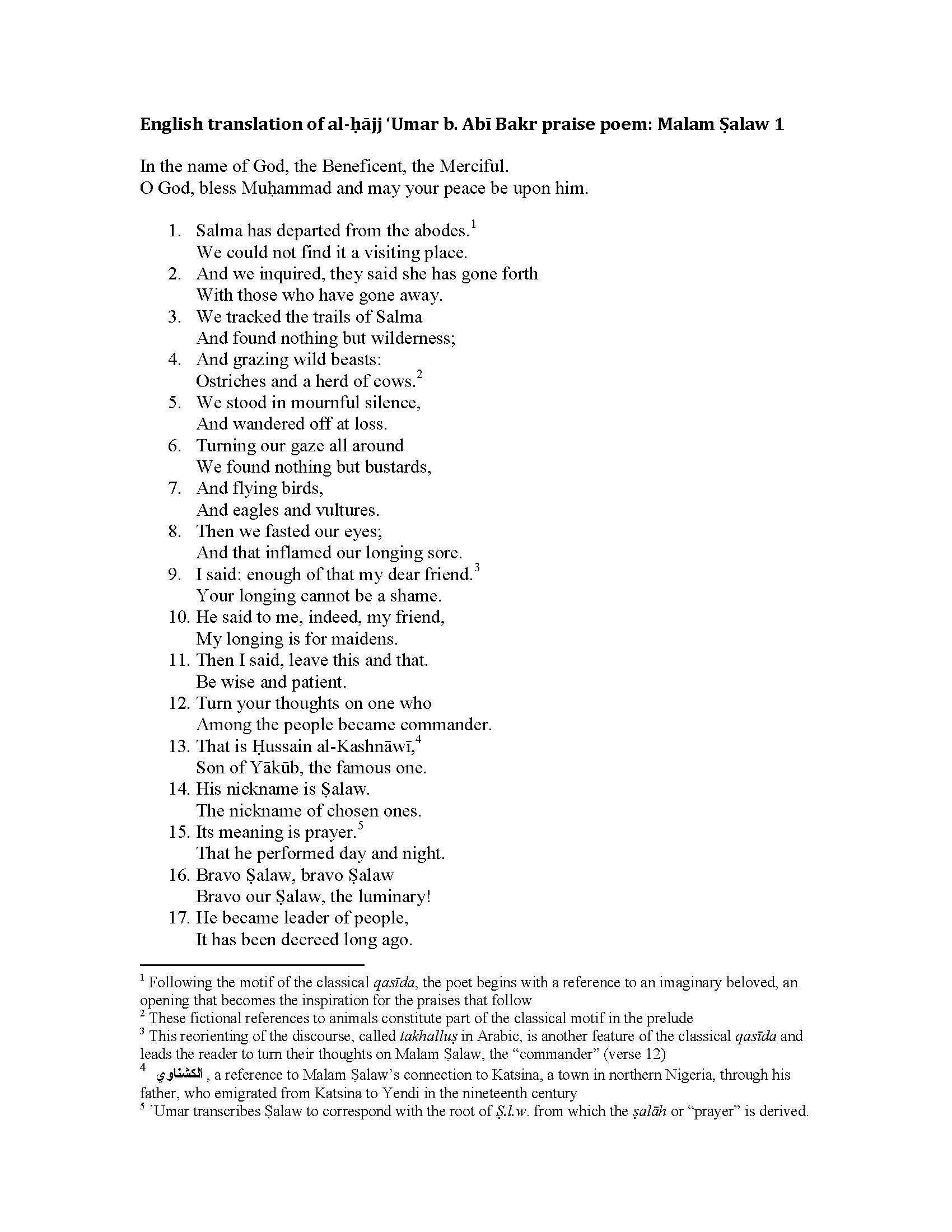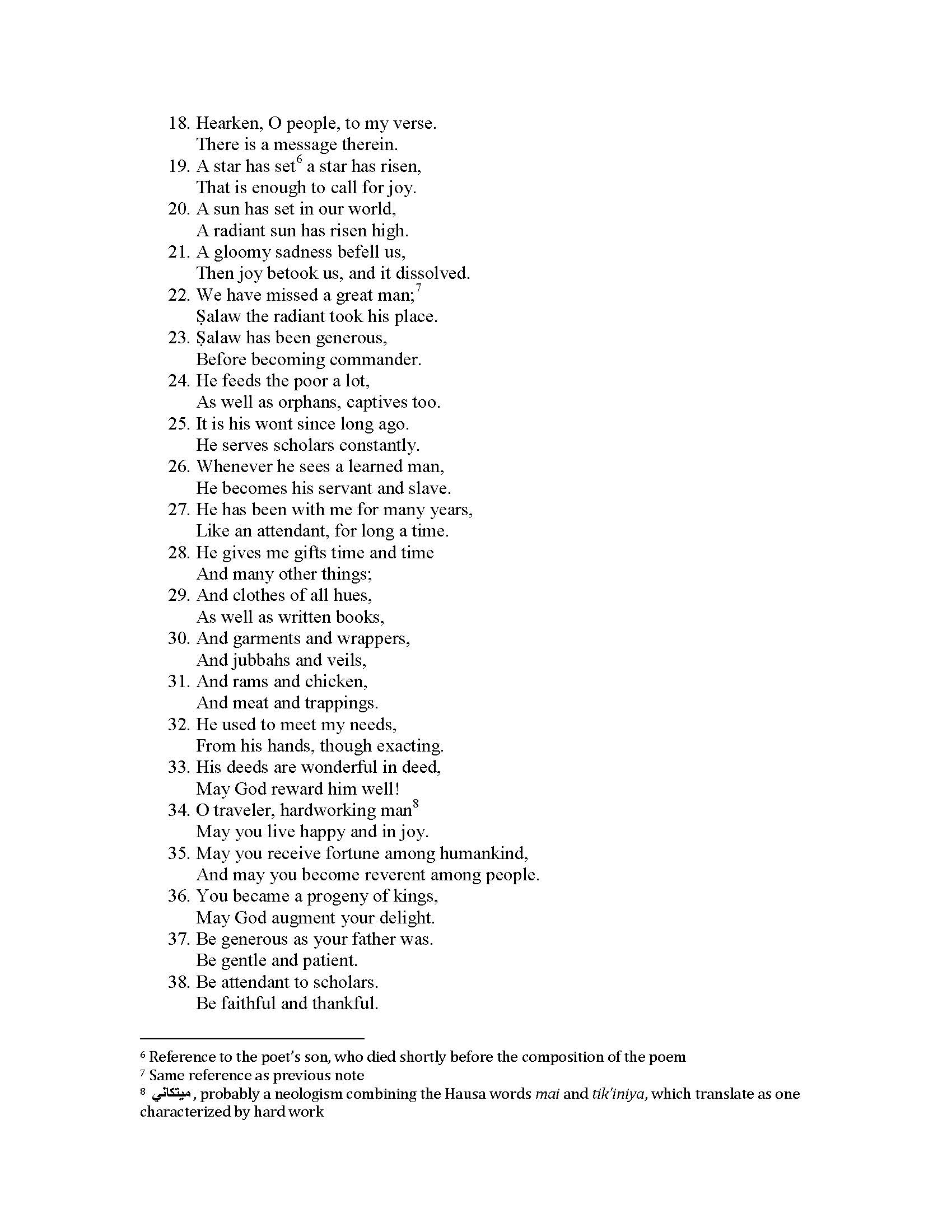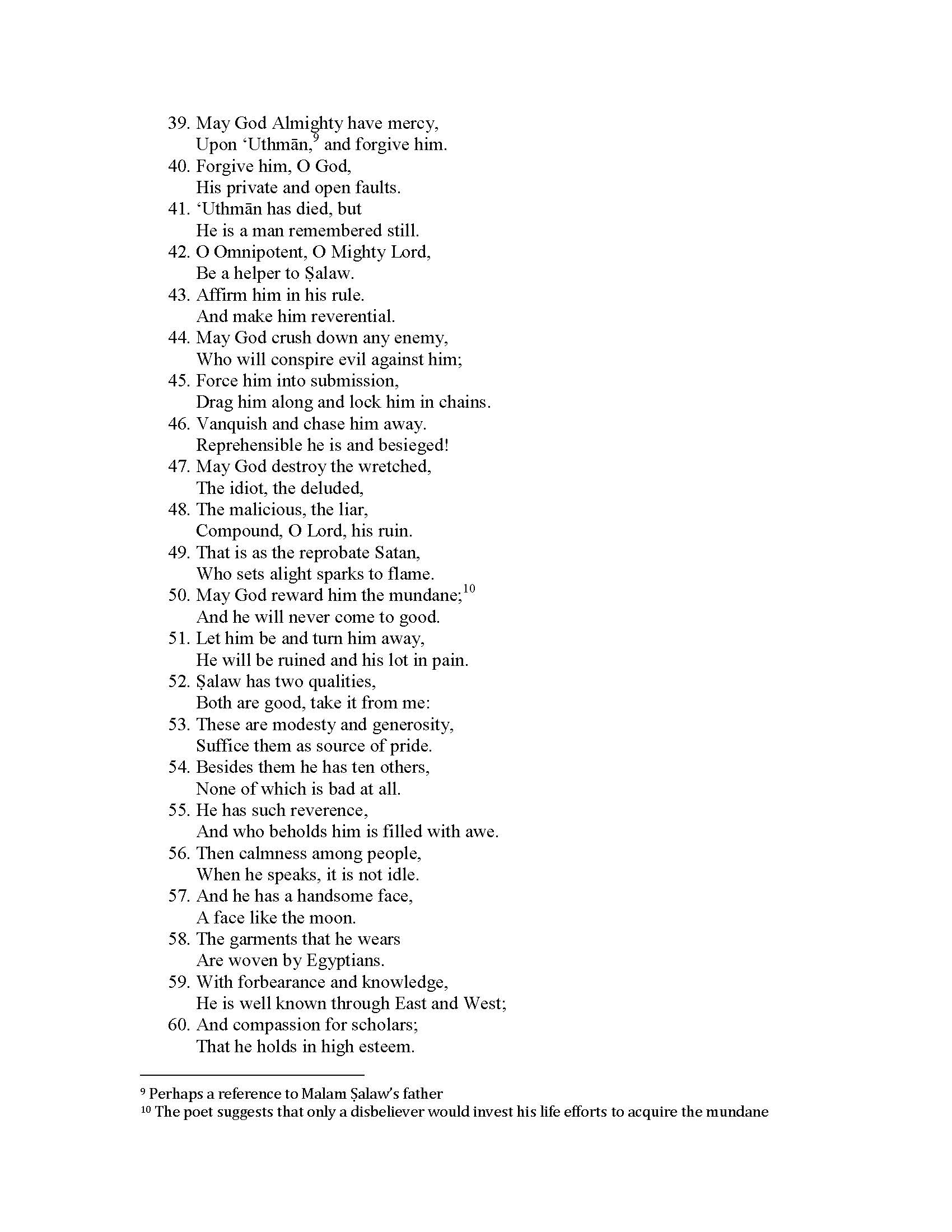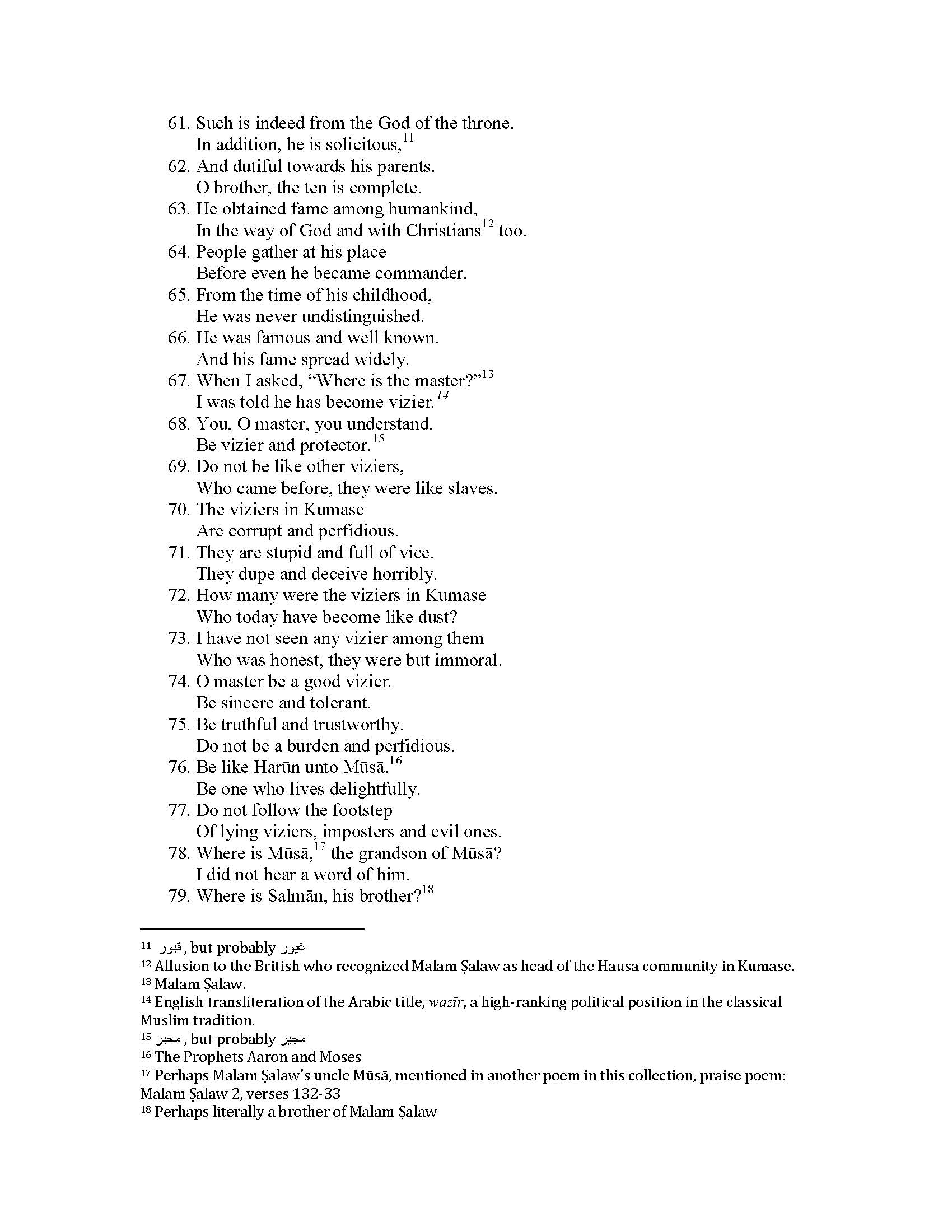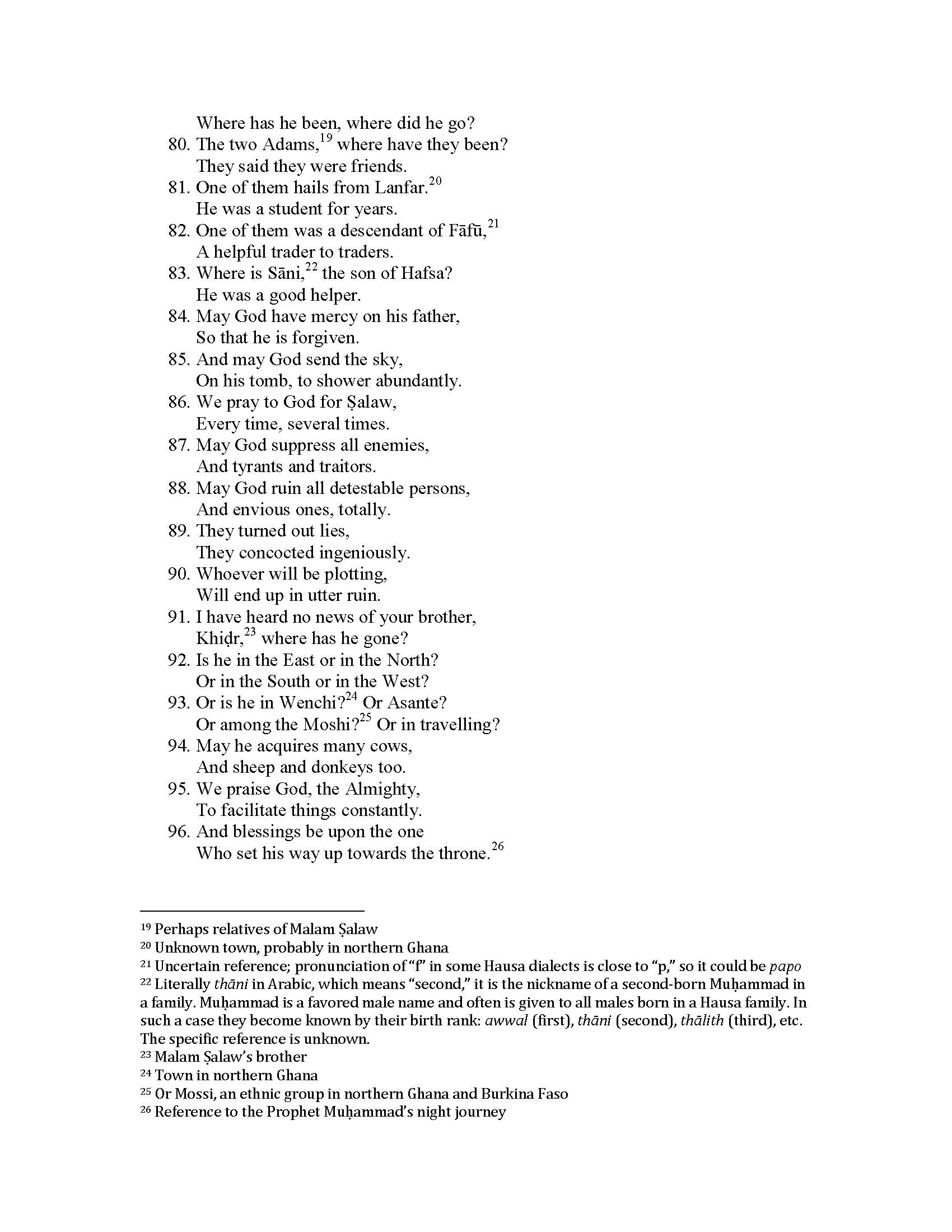Discourses of Muslim Scholars in Colonial Ghana
by John Hanson and Muhammad al-Munir Gibrill
Malam Salaw 1 (praise poem)
Creator: al-ḥājj 'Umar ibn Abī Bakri of Kete-Krachi
Contributing Institutions: Muhammad al-Munir Gibrill; John H. Hanson; Institute of African Studies, University of Ghana at Legon; Northwestern University; MATRIX: The Center for Humane Arts, Letters & Social Sciences Online at Michigan State University
Contributor: Muhammad al-Munir Gibrill (translator and transcriber); John H. Hanson (reviewer)
Description: This praise poem is one of several composed by al-ḥājj 'Umar Krachi (al-ḥājj 'Umar ibn Abī Bakr) in honor of Malam Ṣalaw (Ḥussain al-Kashnāwī).
Malam Ṣalaw was a prominent Hausa scholar who assumed positions of influence in Kumase during the British colonial era. Malam Ṣalaw was born in Yendi (in today's northeastern Ghana); his father originally was from Katsina in northern Nigeria and his mother was related to the royal family of the Dagomba kingdom. Malam Ṣalaw studied with al-ḥājj 'Umar Krachi in his youth and later moved to Kumase, where he was recognized by the British colonial administration as head of the Hausa community. Malam Ṣalaw eventually consolidated considerable influence and secured British recognition as the leading Muslim jurist in Kumase. Resistance to his role from other Muslim communities in Kumase eventually led to his removal from office in 1932, whereupon Malam Ṣalaw departed and took up residence in Katsina. For Malam Ṣalaw's tenure as head of the Hausa community in Kumase, see Enid Schildkroudt, People of the Zongo (Cambridge: Cambridge University Press, 1978), 198-205.
This poem celebrates the appointment of Malam Ṣalaw as head of the Hausa community in Kumase. It uses the Arabic term wazīr (vizier in English), a classical reference to a high Muslim official, in reference to Malam Ṣala's title, although other terms would have been used locally.
Al-ḥājj 'Umar's poem includes numerous biographical and other historical details about Malam Ṣalaw, including a reference to how he gained his nickname Ṣalaw. The poem also provides details about societal life during this period in its reference to Malam Ṣalaw's relatives, such as Khiḍr, for example, who was a trader in cows, sheep and donkeys. Other ethnographical information appears throughout the poem. References to earlier heads also provide insight into the Hausa community in Kumase's zongo before 1919.
The poem is constructed to convey the poet's exhilaration at Malam Ṣalaw's appointment. The short, brisk meter creates a tone of excitement. The beginning, too, emulates the classical Arabic qaṣīda or praise poem, by starting with an amatory prelude in which the poet's persona muses about the absence of a beloved (in this case, Salma). The reverie continues, as the poet looks for her everywhere, but suddenly it ceases. This device expresses the poet’s euphoria as he prepares the reader to learn about the elevation of the poet's beloved patron to an important public position. Note how the poem's topic appears as natural transition through a response to the questioning persona of the prelude. Later, too, the poem returns to this inner reflection by stating in verse 67, "When I asked where is the master/and I was informed he has become a vizier."
The poem provides a detailed description of the qualities of the beloved master, Malam Ṣalaw. The poet conveys how he is overwhelmed by joy, by mentioning only two qualities at first, and then, as if a change of mind, he goes on to mention ten additional other qualities. This poetic strategy suggests an initial flood of emotions that leaves the poet confused. Note, too, that the poet offers words of advice, as al-ḥājj 'Umar calls upon his patron to be a just and honest minister, he also warns him not to emulate earlier heads who were corrupt and have become as forgotten as the dust into which they had become transformed.
The poem also conveys al-ḥājj 'Umar's mourning over his lost son, who died at a young age just as he began to exhibit promises of nobility and piety. The poet consoles himself with the fact that Malam Ṣalaw has become a worthy substitute, "A star has set a star has risen/that is enough to call for joy" (verse 19).
Date: 1919
Date Range: 1910-1919
Location: Kete-Krachi , Volta Region, Ghana
Format: Text/pdf
Language: English
Rights Management: Educational use only, no other permissions
Digitizer: Muhammad al-Munir Gibrill; MATRIX
Archive: University of Ghana at Legon, Institute of African Studies
Source:
University of Ghana at Legon, Institute of African Studies Arabic collection, document number 133. The collection holds another copy: document 239 (ii).
